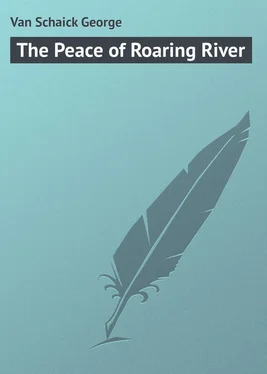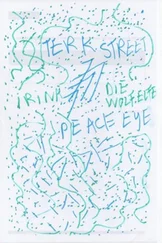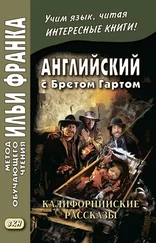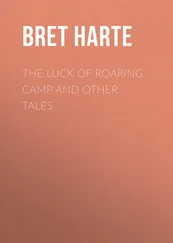Schaick Van - The Peace of Roaring River
Здесь есть возможность читать онлайн «Schaick Van - The Peace of Roaring River» — ознакомительный отрывок электронной книги совершенно бесплатно, а после прочтения отрывка купить полную версию. В некоторых случаях можно слушать аудио, скачать через торрент в формате fb2 и присутствует краткое содержание. Жанр: foreign_prose, на английском языке. Описание произведения, (предисловие) а так же отзывы посетителей доступны на портале библиотеки ЛибКат.
- Название:The Peace of Roaring River
- Автор:
- Жанр:
- Год:неизвестен
- ISBN:нет данных
- Рейтинг книги:5 / 5. Голосов: 1
-
Избранное:Добавить в избранное
- Отзывы:
-
Ваша оценка:
- 100
- 1
- 2
- 3
- 4
- 5
The Peace of Roaring River: краткое содержание, описание и аннотация
Предлагаем к чтению аннотацию, описание, краткое содержание или предисловие (зависит от того, что написал сам автор книги «The Peace of Roaring River»). Если вы не нашли необходимую информацию о книге — напишите в комментариях, мы постараемся отыскать её.
The Peace of Roaring River — читать онлайн ознакомительный отрывок
Ниже представлен текст книги, разбитый по страницам. Система сохранения места последней прочитанной страницы, позволяет с удобством читать онлайн бесплатно книгу «The Peace of Roaring River», без необходимости каждый раз заново искать на чём Вы остановились. Поставьте закладку, и сможете в любой момент перейти на страницу, на которой закончили чтение.
Интервал:
Закладка:
For the best part of three days she staggered about the streets of the big city, answering advertisements found in a penny paper, looking up the signs calling for help, that were liberally enough displayed in the manufacturing district.
Then, one afternoon, she sank down upon a bench in one of the smaller parks, utterly weary and exhausted. Beside her, on the seat, lay a paper which she picked up, hoping to find more calls for willing workers. But despair was clutching at her heart. In most of the places they had looked at her and shaken their heads. No! They had just found the help they wanted. The reason of her disappointments, she realized, lay in the fact that she looked so ill and weary. They did not deem her capable of doing the needed work, in spite of her assurances.
So she held up the paper and turned over one or two pages, seeking the title. It was the Matrimonial Journal ! It seemed like a scurrilous joke on the part of fate. What had she to do with matrimony; with hopes for a happy, contented home and surcease of the never-ending search for the pittance that might keep her alive? She hardly knew why she folded it and ran the end into the poor little worn plush muff she carried. When she reached her room again she lighted the lamp and looked it over. It was merely something with which to pass a few minutes of the long hours. She read some of those advertisements and the keen instinct that had become hers in little less than two years of hard city life made her feel the lack of genuineness and honesty pervading those proposals and requests. When she chanced to look at that far demand from Canada, however, she put the paper down and began to dream.
Her earlier and blessed years had been spent in a small place. Her memory went back to wide pastures and lowing cattle, to gorgeously blossoming orchards whose trees bent under their loads of savory fruit, long after the petals had fallen. She felt as if she could again breathe unpolluted air, drink from clear springs and sit by the edges of fields and watch the waves of grain bending with flashes of gold before the breezes. Time and again she had longed for these things; the mere thought of them brought a hunger to her for the open country, for the glory of distant sunsets, for the sounds of farm and byre, for the silently flowing little river, bordered with woodlands that became of gold and crimson in the autumn. She could again see the nesting swallows, the robins hopping over grasslands, the wild doves pairing in the poplars, the chirping chickadees whose tiny heads shone like black diamonds, as they flitted in the bushes. The memory of it all brought tears to her eyes.
What a wonderful outlook this thing presented, as she read it again. A home by a beautiful river! A prosperous youth who needed but kindliness and affection to make him happy! Why had he not found a suitable mate in that country? She remembered hearing, or reading somewhere, that women are comparatively few in the lands to which men rush to settle in wildernesses. And perhaps the women he had met were not of the education or training he had been accustomed to.
The idea of love, as it had been presented by the men she had been thrown with, in factory and office, was repugnant to her. But, if this was true, the outlook was a different one. Not for a moment did she imagine that it was a place wherein a woman might live in idleness and comparative luxury. No! Such a man would require a helpmeet, one who would do the work of his house, one who would take care of the home while he toiled outside. What a happy life! What a wondrous change from all that she had experienced! There were happy women in the world, glorying in maternity, watching eagerly for the home-coming of their mates, blessed with the love of a good man and happy to return it in full measure. It seemed too good to be true. She stared with moistened eyes. If this was really so the man had doubtless already received answers and chosen. There must be so many others looking like herself for a haven of safety, for deliverance from lives that were unendurable. Who was she that she should aspire to this thing? To such a man she could bring but health impaired, but the remnants of her former strength. In a bit of looking-glass she saw her dark-rimmed eyes and deemed that she had lost all such looks as she had once possessed.
Yet something kept urging her. It was some sort of a fraud, doubtless. The man was probably not in earnest. A letter from her would obtain no attention from him. A minute later she was seated at the table, in spite of all these misgivings, and writing to this man she had never seen or heard of. She stated candidly that life had been too hard for her and that she would do her best to be a faithful and willing helper to a man who would treat her kindly. It was a poor little despairing letter whose words sounded like a call for rescue from the deep. After she had finished it she threw it aside, deciding that it was useless to send it. An hour later she rushed out of the house, procured a stamp at the nearest drug-store, and threw the letter in a box at the street-corner. As soon as it was beyond her reach she would have given anything to recall it. Her pale face had become flushed with shame. A postman came up just then, who took out a key fastened to a brass chain. She asked him to give her back her letter. But he swept up all the missives and locked the box again, shaking his head.
“Nothing doing, miss,” he told her, gruffly.
Before her look of disappointment he halted a few seconds to explain some measure, full of red-tape, by which she might perhaps obtain the letter again from the post-office. To Madge it seemed quite beyond the powers of man to accomplish such a thing. And, moreover, the die was cast. The thing might as well go. She would never hear from it again.
The next day she found work in a crowded loft, poorly ventilated and heated, and came home to throw herself upon her bed, exhausted. Her landlady’s children were making a terrible noise in the next room, and the racket shot pains through her head. On the morrow she was at work again, and kept it up to the end of the week. When she returned on Saturday, late in the afternoon, with her meagre pay-envelope in her ragged muff, she had forgotten all about her effort to obtain freedom.
“There’s a letter for ye here, from foreign parts,” announced Mrs. MacRae. “Leastwise ’t ain’t an American stamp.”
Madge took it from her, wondering. A queer tremor came over her. The man had written!
Once in her room she tore the envelope open. The handwriting was queer and irregular. But a man may write badly and still be honest and true. And the words she read were wonderful. This individual, who merely signed A. B. C., was eager to have her come to him. She would be treated with the greatest respect. If the man and the place were not suited to her she would naturally be at liberty to return immediately. It was unfortunate that his occupations absolutely prevented his coming over at once to New York to meet her. If she would only come he felt certain that she would be pleased. The hosts of friends he had would welcome her.
Thus it ran for three pages and Madge stared at the light, a tremendous longing tearing at her soul, a great fear causing her heart to throb.
She forgot the meagre supper she had brought with her and finally sat down to write again. Like the first letter it was a sort of confession. She acknowledged again that life no longer offered any prospect of happiness to her. After she looked again in the little glass she wrote that she was not very good-looking. To her own eyes she now appeared ugly. But she said she knew a good deal about housekeeping, which was true, and was willing to work and toil for a bit of kindness and consideration. Her face was again red as she wrote. There was something in all this that shocked her modesty, her inborn sense of propriety and decency. But, after all, she reflected that men and women met somehow, and became acquainted. And the acquaintance, in some cases, became love. And the love eventuated in the only really happy life a man or a woman could lead.
Читать дальшеИнтервал:
Закладка:
Похожие книги на «The Peace of Roaring River»
Представляем Вашему вниманию похожие книги на «The Peace of Roaring River» списком для выбора. Мы отобрали схожую по названию и смыслу литературу в надежде предоставить читателям больше вариантов отыскать новые, интересные, ещё непрочитанные произведения.
Обсуждение, отзывы о книге «The Peace of Roaring River» и просто собственные мнения читателей. Оставьте ваши комментарии, напишите, что Вы думаете о произведении, его смысле или главных героях. Укажите что конкретно понравилось, а что нет, и почему Вы так считаете.












